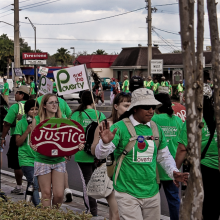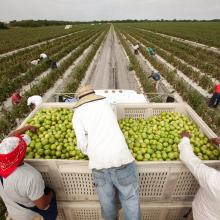Coalition of Immokalee Workers
Farmworkers in Palm Beach, Fla. are set to march five miles in protest of Wendy’s treatment of farmworkers, and their protest has received a blessing from the Archbishop Thomas Wenski.

Coalition of Immokalee Workers. Image via CWMc/Flickr
The boycott stems from Wendy’s refusal to CIW’s Fair Food Program, a workplace-monitoring program that the group designed to prevent worker abuse and exploitation, according to the Houston Chronicle.
Wendy’s has moved some operations out of Florida — where tomato growers had begun implementing the Fair Food Program — to Mexico, where worker abuse in the industry has been widely documented.
After more than two decades of working to increase social responsibility in the agricultural industry, the Coalition of Immokalee Workers (CIW) has announced a new partnership with a leading grocer that will bring "Fair Food" tomatoes — ones that are responsibly sourced — to more than 50 million new customers a month in nearly 780 new stores in 14 states.
This new collaboration between Ahold USA (parent company to Giant, Stop & Shop, and Peapod) and CIW sends an important message across the grocery industry: supporting a modern and humane agricultural industry improves the lives of agricultural workers.
Closer to home, one of the messages that many of us often hear is that there is slavery in the supply chains of the products that we buy every day: cotton, chocolate, produce. This can be paralyzing when we go to the mall or the grocery store. None of us want to purchase something that originates in an extreme human rights violation. But the solution cannot be simply to buy a different product. When we talk about labor trafficking, we must keep the focus on the worker who is enslaved rather than the product we consume.
As a rabbi, I know that is not my tomato or banana that is created in the image of God—it is the person who picked that product. Fighting for food justice means ensuring the human rights and wages of workers, and doing so in a way that places the needs, dignity, and expertise of the workers at the head of the table. This last piece is crucial: no one can tell us how best to solve human rights abuses in supply chains, including modern slavery, more than the workers who have the most at stake...
We must raise up the leadership of those most affected by forced labor and support their efforts to create new futures for themselves. Since 2011, T’ruah has taken more than 50 rabbis to Immokalee to learn from the CIW. The stories they hear—and the transformation they see—inspire them to go home and turn their congregations into more than just educated consumers. They become activists: they write letters to corporations urging them to join the Fair Food Program, stage protests, take Hebrew school students to meet with managers, write op-eds, and deliver sermons. Our #TomatoRabbis have become part of the larger movement of Fair Food activists, urging corporations to live up to their professed values and join the new day dawning in the Florida tomato industry that is the only proven slavery-prevention program in the U.S.

Image via FOOD CHAINS on Facebook. https://www.facebook.com/FoodChainsFilm
There is an ancient Sanskrit mantra — Annam Brahma — which Indian sages and seers of the hoary past uttered before taking their daily bread. That mantra, which originated thousands of years ago, is translated as “Food is God.” The modern Indian mystic Sri Chinmoy said, “Food gives us new life; it energizes us. Anything that energizes us is life — the stream of life — and life is God.”
This mantra suggests that without food, men and women would not have the energy to pursue their quest for the truth, for light, for God. Food enables our journey to self-discovery and God-discovery. Therefore we are grateful for our food, for it takes us home, to our Source.
Nearly every faith tradition places a spiritual significance on food — from animist religions that celebrate the harvest to Christianity’s taking of the sacrament —symbolizing the sacrifice of Jesus. We link these ritual acts of feeding our bodies to the feeding of our soul through gratitude and remembrance.
It is incredibly apt that this year’s Food Day is dedicated to farmworkers, who occupy the invisible base of our nation’s food system. I use the word “invisible” because if we truly comprehended the abuse they endured, both spiritual and physical, we would rise resolutely in defense of their rights.
We have reached that point in the year when the images we are inundated with show off variations on a theme: the Norman Rockwell-esque holiday gathering. They are a testament to the ability of advertising to tug on our heartstrings as the large, joyful family sits down to a table lavishly set with the antique china, candles twinkling, and a feast spread as the Christmas meal in all its glory looms and the joy and generosity of the season is palpable.
Here in Florida, the grocery store chain Publix is as ubiquitous to holiday celebrations as pie. Publix has been a part of our Christmas celebrations for generations and yet this year impromptu runs to the family-owned grocer will simply not be an option for the Reverend Clay Thomas, or for those who stand with him.
As it turns out, earlier this year Reverend Thomas was ejected and then banned from a Sarasota, Fla., Publix.
His crime?
He supports the Coalition of Immokalee Workers (CIW).
On October 13, the Coalition of Immokalee Workers and Pacific Tomato Growers (CIW) -- one of the country's oldest and largest tomato producers -- announced a http://www.ciw-online.org/CIW_Pacific_joint_relea
Young and old, large and small, farmers and pastors, men and women all lined the streets in front of Publix grocery stores in Florida last month.
It was quite a busy year for the policy team at Sojourners, and we can already hear the challenges and opportunities of 2009 calling for our attention.



